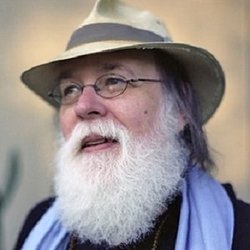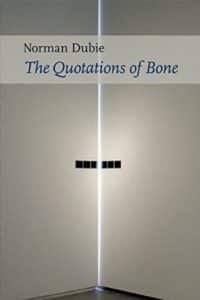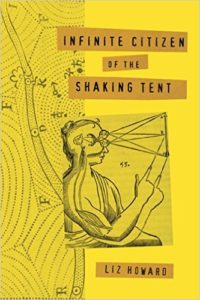Canada’s Griffin Prize was created in 2000 to encourage excellence in poetry. It’s awarded to “first edition books of poetry written in, or translated into, English and submitted from anywhere in the world.” Both an international and Canadian prize is awarded each year, and it’s one of the biggest monetary prizes in the world for poetry—Canadian $65, 000 for each award, or about US $50, 000 at current exchange rates.
This year, the international prize was awarded to American Norman Dubie for his The Quotations of Bone, published in 2015, and the Canadian prize to Liz Howell for her Infinite Citizen of the Shaking Tent, also published in 2015.
Dubie, who is Regents Professor of English at Arizona State University, is one of America’s distinguished poets, with some 16 previous published collections. No matter what his subject in this new collection, whether politics, nature, relationships, or even British Petroleum, his imagery is jarring, demanding the poem be read closely, carefully, and (preferably) aloud.
Here is the title poem from the collection—be prepared for the imagery and metaphors.
The meal of bone was a soured milk—
just the heads of giant elk
in a dark circle looking down
on a wooden bowl of soda crackers
and pork. One large knife
resting in the meat
of a woodsman’s calloused hand,
He grins at his woman
who is slowly poisoning him
with the stringy resins of morning glory.
A tasteless turpentine with pink pig.
The speeches of bone
are matrimonial in early autumn—
by January there’s a froth of blood
at a nostril.
He thinks a long icicle is buried in his ear.
She thinks D.H. Lawrence was a grim buccaneer.
I hate most men. Adore the few named Lou.
One small addendum:
the dead elk are grinning too.

Norman Dubie
The Quotations of Bone is a collection that simply can’t be read hurriedly, but slowly and with concentration. The reward will be gratifying for the reader.
Dubie’s previous poetry collections include Popham of the New Song (1975); In the Dead of the Night (1976); The Illustrations (1977); City of the Olesha Fruit (1979); The Everlastings (1980); Selected and New Poems (1983); The Springhouse (1986); Groom Falconer (1990); The Clouds of Magellan (1991); Radio Sky (1992); The Mercy Seat: New and Collected Poems 1967-2001 (2004); Ordinary Mornings of a Coliseum (2004); Insomniac Liar of Topo (2007); Alehouse Sonnets (2009); and The Volcano (2010). He received his MFA degree from the Iowa Writers’ Workshop.
Liz Howard’s award for Infinite Citizen of the Shaking Tent was something was something of a surprise—it was her first published collection of poems. And her background and university training are not literary—she’s a research officer in cognitive psychology at the University of Toronto. She has previously published a chapbook, Skullambient (the poems of Skullambient are included in Infinite Citizen of the Shaking Tent), and her poetry has appeared in such Canadian literary journals such as The Capilano Review, The Puritan, and Matrix Magazine.
The poems in the collection are related and often loop with the same title. She combines nature, time, science, and elements of Canadian native religion into a striking collection of poems. This poem is from the first section in the collection, entitled “Hyperboreal.”
Your eyes open the night’s slow static at a loss
to explain this place you’ve returned to from above;
cedar along a broken shore, twisting in a wake of fog.
I’ve lived in rooms with others, of no place and no mind
trying to bind a self inside the contagion of words while
your eyes open the night’s slow static. At a loss
to understand all that I cannot say, as if you came
upon the infinite simply by thinking and it was
a shore of broken cedar twisting in a wake of fog.
If I moan from an animal throat it is in hope you
will return to me what I lost learning to speak.
Your eyes open the night’s slow static at a loss
to ever know the true terminus of doubt, the limits of skin.
As long as you hold me I am doubled from without and within:
a wake of fog unbroken, a shore of twisted cedar.
I will press myself into potential, into your breath,
and maybe what was lost will return in sleep once I see
your eyes open into night’s slow static, at a loss.
Broken on a shore of cedar. We twist in a wake of fog.

Liz Howard
Born and raised in Canada, Howard received her Honours Bachelor of Science with High Distinction from the University of Toronto. She recently received her Master of Fine Arts degree from the University of Guelph.
The Griffin Prize has established itself as one of the world’s most prestigious (and financially rewarding) prizes in poetry, and the recognition of the work of Dubie and Howard enhances the prize’s reputation.
Related:
Liz Howard reads “Boreal Swing” on CBC Radio and is interviewed by Radio Canada International.
Norman Dubie reads his “Prologue: Death and the Maiden Dementia.”
About the Griffin Prize and its distinguished list of trustees.
Photo by Diana Robinson, Creative Commons, via Flickr. Post by Glynn Young, author of the novels Dancing Priest and A Light Shining, and Poetry at Work.
__________________________

“I require all our incoming poetry students—in the MFA I direct—to buy and read this book.”
—Jeanetta Calhoun Mish
- Longfellow’s “Paul Revere’s Ride”: Creating a National Legend - April 17, 2025
- Poets and Poems: Katie Kalisz and “Flu Season” - April 15, 2025
- Poets and Poems: Michelle Ortega and “When You Ask Me, Why Paris?” - April 10, 2025



Maureen says
What striking differences between the two poets!
Bethany says
Thank you for this post, I enjoyed learning a bit about both brilliant poets. Liz Howard’s poem, “A Wake” connected with me. So many rich and unique lines and phrases. Taken apart, and put back together as a whole – it is stunning.